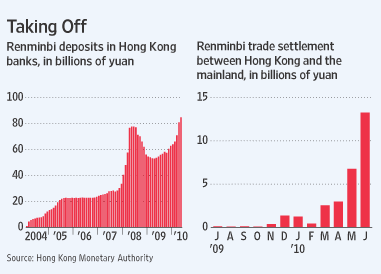The slow conversion of the Chinese yuan
 Saturday, September 4, 2010 at 12:05AM
Saturday, September 4, 2010 at 12:05AM  First off is a WSJ column by Peter Stein (The view from Hong Kong) that notes that city-state's emerging role as proving ground for how Chinese currency will be traded outside the mainland, as banks there are starting to lend yuan to one another and offering hedging services.
First off is a WSJ column by Peter Stein (The view from Hong Kong) that notes that city-state's emerging role as proving ground for how Chinese currency will be traded outside the mainland, as banks there are starting to lend yuan to one another and offering hedging services.
What started this was a June agreement between HK and China on "removing certain limits on usage of China's yuan within Hong Kong."
The result:
In the past, businesses were mostly confined to opening yuan accounts for trade-settlement purposes; now, accounts can be opened for any purpose. Businesses and individuals alike now can transfer yuan freely between accounts. Banks also can help businesses convert yuan without restriction.
While the HK dollar (pegged to our own) remains the official currency, yuan is now "sloshing around the savings accounts of Hong Kong banks in bigger and bigger sums."
All of this is practice for how everybody around the world will someday soon use the yuan, with hedging services being the ability to bet on the yuan's direction. This shift will correct a weird anomaly: China conducting all its trade in dollars, euros and yen.
Expect half of China's Gap trade to be done in yuan within a few years, predicts the piece. As one HSBC banker puts it, "I think this whole process is going to develop faster than most people expect."
That was early August.
Then in late August the FT runs a front-pager declaring that "a number of the world's biggest banks have launched international roadshows promoting to corporate customers the use of the renminbi [another word for the yuan; renminbi is to sterling (currency name) what yuan (denominating units) is to the pound], instead of the dollar, for trade deals with China."
What this says: big global banks want to profit "from what is expected to be a rapidly growing line of business in the future."
Finally, an FT editorial puts it this way:
Dominance of the global economy, Beijing believes, goes hand-in-and with dominance of the global monetary system.
Measures to internationalise the renminbi are nothing new. Hong Kong banks have offered offshore renminbi accounts for more than six years, and currency swap agreements with foreign central banks have been in place since 2000. But they have accelerated in recent months . . .
These are, however, only small steps. Whether China will be able to stomach the rest of the renminbi’s journey to reserve currency status is far from clear.
A reserve renminbi would have to be fully convertible, on the capital account as well as the current account. But this would imply opening up China to the whims of global capital – precisely what it has been protecting itself against (as its huge foreign exchange reserves attest). Freer capital flows may also prove destabilising for domestic banks, creating liquidity bubbles in good times and choking off the credit supply as conditions deteriorate. No longer would the banking sector be an effective instrument of macroeconomic policy, as it has been during the crisis with its government-induced lending sprees. It would be a source of, and not a remedy to, increasing economic volatility.
Even less palatable for the government is the prospect of losing control over the renminbi. Maintaining a currency peg in the face of massive capital inflows is extremely difficult . . .
China will become the world’s largest economy in the next few decades. It is natural that the renminbi eventually attains reserve currency status. China should not push this process forward prematurely, lest it destabilises its economy. But the sooner it starts the domestic reforms that will prepare it for such a shift, the easier it will find its new international role.
Like most things with China, we'd like it to go faster, to even the playing field more. But as the FT points out, for China to remain stable, such an evolution needs to be that--an evolution.
But you have to see all this as positive: China opens itself up more and more to profound market forces, but admittedly at a pace whereby the Communist Party hopes to retain power ad infinitum--even as everybody in that system knows this to be impossible.
How so? Show me a developed country of any size that isn't a democracy. Yes, you can show me a city-state or two, or a decent-size rich state like Saudi Arabia. But I'm talking about development--not just wealth, and not some puny emirate ruled over by an potentate or tiny technocratic elite.










Reader Comments